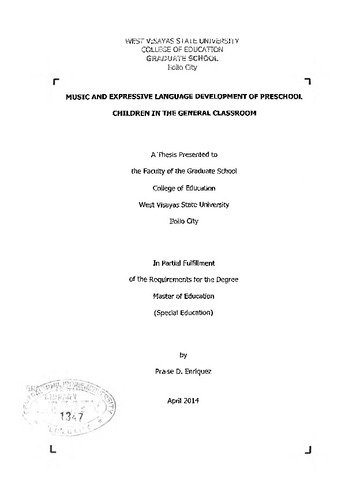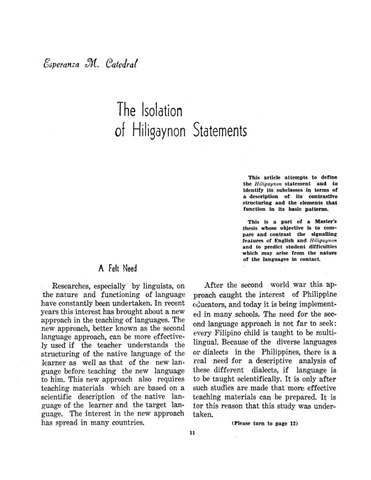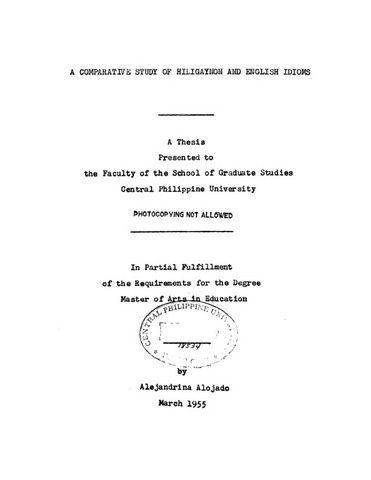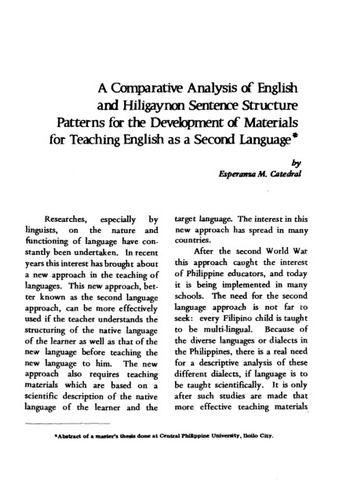Music and expressive language development of preschool children in the general classroom

Page views
1,070Date
2014Auteur
Thesis Adviser
Defense Panel Chair
Share
Metadata
Afficher la notice complète
Résumé
Language development in a preschool regular classroom is a broad area to tackle. To date, gray areas as to how such a skill is acquired are still plenty, and the disputation as to what element best contributes to the success in language development is greater still.
The study was conducted to discuss and determine if music had a significant influence on the expressive language development of preschool children in the general classroom and was anchored on two theories, namely: Ivan Pavlov's conditioning theory that suggests responses can be acquired from a stimulus, that learning is associative; and Jean Piaget's learning theory, specifically the principles encompassing the sensorimotor and preoperational stages when children are most in need to be gratified in their sensorial needs. With this, the researcher took two (2) Kinder 1 classes in the Central Philippine University Kindergarten and randomly assigned them to groups for a pre-test/post-test experimental study where music as a medium of instruction was the independent variable, and expressive language skill was the dependent variable. A pre-determined set of routinely conversational phrases was transcribed into songs, and were used within the classroom with the aid of an intervention matrix. Singing the aforementioned phrases was done with the experimental group, while the control group had to hear and learn to say the same phrases without the tune. During the first week of the intervention phase, all the pupil respondents where pre-tested to determine their level of expressive language development and to decide if the groups were testable. Every week, they were post-tested on the same using a researcher-made tool called the Uttered Word Count. The experiment lasted for eight (8) weeks. Upon the conclusion of the data analyses of the scores using statistical tools such as the mean, standard deviation, the Mann Whitney U Test, and the Wilcoxon matched-Pairs Signed Rank Test, it was found that a significant difference occurred between the pre-test and post-test scores of the pupils from both groups. A significant difference was also found in the pre-test and post-test scores of the respondents in the control group, as well as those in the experimental group. However, as it appeared that while a considerable improvement was established, a prominent 51.94% mean rate of increase in the scores of the respondents in the experimental group was consequently found significantly higher than the 24.29% mean rate of increase in the scores from the control group.
Description
Abstract only
Suggested Citation
Enriquez, P. D. (2014). Music and expressive language development of preschool children in the general classroom (Unpublished Master’s thesis). West Visayas State University, Iloilo City.
Type
ThesisSujet
Department
Graduate SchoolDegree
Master of Education (Special Education)Shelf Location
GSL Theses 378.242 En72 2014
Physical Description
99 leaves
Collections
- Theses [18]
Related items
Showing items related by title, author, creator and subject.
-
The isolation of Hiligaynon statements
Catedral, Esperanza M. (Central Philippine University, 1965-01)This article attempts to define the <em>Hiligaynon</em> statement and to identify its subclasses in terms of a description of its contrastive structuring and the elements that function in its basic patterns. This is a ... -
A comparative study of Hiligaynon and English idioms
Alojado, Alejandrina (1955)When teachers of English get together and talk shop they complain of the weaknesses of their classes both in oral speech and in written work. This observation is not of the English teachers alone but also of other educators ... -
A comparative analysis of English and Hiligaynon sentence structure patterns for the development of materials for teaching English as a second language
Catedral, Esperanza M. (Central Philippine University, 1975)Researches, especially by linguists, on the nature and functioning of language have constantly been undertaken. In recent years this interest has brought about a new approach in the teaching of languages. This new approach, ...




